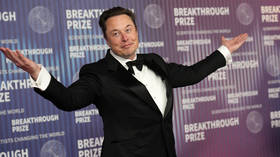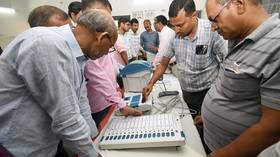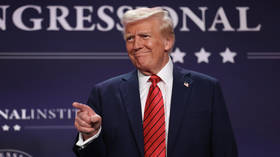Indians challenge Elon Musk over voting machines

Tesla CEO Elon Musk has triggered backlash in India over his take on electronic voting machines (EVMs). The country of 1.4 billion people recently wrapped up its general election, in which 640 million Indians voted, primarily using EVMs.
Musk claimed on Saturday that electronic voting machines should be “eliminated.”
“The risk of being hacked by humans or AI, while small, is still too high,” he posted on X (formerly Twitter). He was responding to a post by US presidential candidate Robert F. Kennedy Jr, who had pointed to an Associated Press report suggesting that Puerto Rico’s primary elections had experienced voting irregularities related to electronic voting machines. However, Musk’s post reignited an old debate in India.
“This is a huge sweeping generalization statement that implies no one can build secure digital hardware,” said Rajeev Chandrasekhar, who served as minister of state at India’s Ministry of Electronics and Information Technology in the last Modi-led government.
Chandrasekhar, who is a prominent member of India’s ruling Bharatiya Janata Party (BJP), suggested that devices used in the US may be connected to the internet and would therefore be vulnerable. However, EVMs used in India are “custom-designed to do a simple job.” These devices are “isolated” from any network and “factory programmed controllers that cannot be reprogrammed,” claimed the former minister.
'Elon Musk has not talked about EVMs in India and Congress is raising issue after defeat ' says BJP leader Rajeev Chandrasekhar @AnchorAnandN speaks to @RajeevRC_X#BJP#Congresspic.twitter.com/D21GorONQv
— News18 (@CNNnews18) June 17, 2024
Prominent Indian author and retired government officer Sanjay Dixit also joined in the debate, offering $1 million to Musk to prove that the country’s voting machines could be hacked. “If you hack it successfully, give you a million dollars, if you fail, you pay,” Dixit wrote on X.
Hello @elonmusk - take up a million dollar challenge from us to hack an Indian EVM. If you hack it successfully, I give you a million dollars, if you fail you pay. Ok? https://t.co/vBa2YGzxfh
— Koi Sanjay Dixit ಸಂಜಯ್ ದೀಕ್ಷಿತ್ संजय दीक्षित (@Sanjay_Dixit) June 17, 2024
Indian EVMs, which replaced paper ballots in 2004, have triggered intense debate on many occasions, particularly during general elections, when they were blamed for unfavorable results by losing parties.
Rahul Gandhi, the leader of the Indian National Congress, the country’s largest opposition party, backed Musk’s statement, claiming that EVMs in India are a “black box” that nobody is allowed to scrutinize. India’s Election Commission must either ensure complete transparency in relation to the machines and processes, or abolish them, Gandhi said.
Akhilesh Yadav, the leader of the Samajwadi Party, a key ally of the Congress, also questioned the credibility of EVMs, and demanded that all future elections should be conducted using ballot papers.
Notably, when the BJP lost an election to the Congress-led United Progressive Alliance (UPA) in the past, it also attributed the loss to “EVM fraud.”
In April, India’s Supreme Court cautioned against doubting the efficiency of India’s voting system, including the reliability of EVMs. The court heard a number of petitions that suggested using paper ballots, citing examples from European countries. In response, Sanjiv Khanna, one of the justices presiding over the case, said: “We have our own system. It’s working well.”
Where India Meets Russia: Follow and share RT India on X and Instagram














